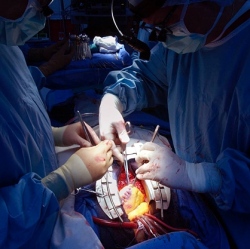
Three babies have been saved from a life-threatening condition by using 3D printed windpipe splints. The patients suffer from an illness that means their windpipes can collapse. The device was rapidly customised for each individual. And unlike most 3D implants, it was made of material that changed shape as the children grew.
The research appears in Science Translational Medicine. Due to the small number of children involved in the study it does not prove it will work in every case. But it does show the splints could be a promising option for a condition that has no cure, researchers from CS Mott Children’s Hospital at the University of Michigan say.
One in 2,000 children have tracheobronchomalacia – a weakening and collapse of the windpipe (trachea) that would normally allow air to travel to the lungs. Those with the most severe form have a poor chance of surviving. But if they can get to the the age of three, their windpipes have often strengthened enough to allow them to breathe well.
Kaiba Gionfriddo had the procedure when he was just three months old. He was in a critical condition, needing intensive care because his body was not getting the oxygen it needed. So doctors sought emergency approval to use the device as a a last resort. Lead researcher Dr Glenn Green described it as a ground-breaking case.
Kaiba is now "an active, healthy three-year old in preschool with a bright future", researchers said.
